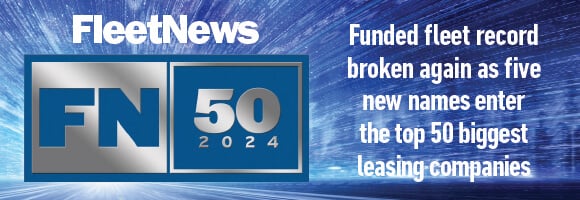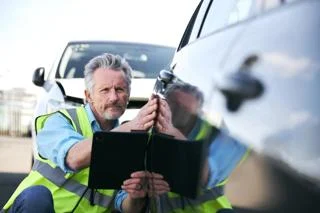This article has been taken from the FN50 2024 special report, providing insight into the UK’s biggest car, van and truck contract hire, leasing and fleet management companies. It is sponsored by Ford, Allscreens Nationwide, Cox Automotive, Fleet Procure, FMG, Geotab, Jaama, Leasing Portal, Mer, Nexus, System Edstrom and vGroup International.

The role of the fleet decision-maker is more important than ever.
That’s the clear message from FN50 leasing bosses who believe overwhelmingly that the growing complexity of technology, electrification, energy management, data management, connectivity and regulatory compliance means companies should be employing professional, skilled fleet leaders.
It’s a complete reversal on the prevailing views of just a few years ago when the fleet manager was viewed as obsolete for all but the largest, most complex operations.
As reported by Fleet News, a growing number of companies have started recruiting their first-ever fleet managers.
But the view of Marshall Leasing managing director Greg McDowell will resonate with many when he says: “The role continues to be under-appreciated by some companies.”
This observation is reinforced by Arval which claims that “businesses are still slow to catch on” to the need for a fleet manager.
Managing director Lakshmi Moorthy explains: “There has been a trend of removing a dedicated role of fleet manager, and making it part of HR/ Reward, Procurement or Facilities, where it forms just part of a role – resulting in a loss of experience and knowledge in the industry. However, it is still strategically important.
“For example, with the rise in connected fleets and data being key in decision-making, it’s the art of interpreting this data and how this impacts the wider fleet that is being missed, and decisions may be made that can have a fundamental impact to fleet operations.”
However, not every leasing provider is a paid-up member of the fleet manager appreciation society.
Three smaller companies feel fleet managers are outdated and no longer relevant.
Adept Vehicle Management declares bluntly that companies should “outsource to fleet management companies for half the cost”, a view espoused by Fleet4You which adds that “leasing providers can do more for companies”.
AMT Vehicle Rental, meanwhile, says the importance of fleet managers is diminishing “due to more advanced systems and AI”.
Revival of fleet manager
Their opinions are very much in the minority, though, marking a definitive revival of the fleet manager.
Artificial intelligence (AI) is an interesting development. ICR Leasing also feels it could “potentially” erode elements of the fleet manager role, but adds stoutly: “With such a changing market, fleet managers that really know their stuff and keep up to date are at the cutting edge and are worth more than ever.”
And Leasys believes AI could aid fleet managers by providing greater insight into data which would “support some of the roles that the fleet manager would normally manage”, says marketing director Shane Coomber, “freeing them up to focus on more strategic priorities”.
Alphabet is unequivocal that the role of fleet manager “is more important than ever”, driven by a combination of increasing regulatory demands, corporate sustainability goals and ongoing market uncertainty.
Chief sales officer Ian Turner says: “From emissions standards to the potential tax changes in upcoming Budgets, fleet managers must stay ahead of evolving regulations, while balancing costs and efficiency.
“As more companies commit to net-zero emissions targets, fleet managers are integral to aligning vehicle strategies with broader corporate sustainability goals.
“The increasing availability of vehicle connectivity and data is also transforming the role. With more sophisticated telematics and real-time data, fleet managers can gain new insights into fleet performance, maintenance and driver behaviour.
“This is particularly game-changing for light commercial vehicle fleets, where operational efficiency and uptime are critical.
“The ability to manage this data effectively requires fleet managers to be not just operational overseers but strategic decision-makers who can translate data into actionable insights.”
The UK’s two largest leasing providers, Lex Autolease, which operates outsourced contracts for a number of companies, and Ayvens both draw a distinction between different fleet profiles.
Lex Autolease feels the role of a fleet manager is less important on car fleets with companies outsourcing, leaving procurement, finance or HR as the main stakeholders.
It adds: “However, the converse applies in LCVs which are becoming more complex, and with the ZEV Mandate focusing attention on electrifying LCV fleets, the ‘in-house’ fleet manager will have the specific knowledge, oversight and responsibility to structure the transition effectively.”
Ayvens takes a similar stance, highlighting differences between perk fleets, where the focus is more on benefits schemes such as salary sacrifice, and business-critical fleets.
“The former have less need of a traditional fleet manager and can be administered by an outsourced fleet manager, reporting into the benefit and reward function of HR,” says the company.
“But business-critical fleets have always relied on a fleet manager to ensure smooth and economical operation.
“Fleets must grapple with the real challenges of full decarbonisation, and the organising mind of a good fleet manager will be essential to ensure that the right outcomes are achieved, without losing control of costs or negatively affecting their organisation’s ability to fulfil its core functions.”
Outsourcing only goes so far
Outsourcing only gets a company so far, though, according to Multifleet Vehicle Management.
“It may be beneficial for a business to outsource many elements of the fleet to a competent fleet management business which delivers savings and efficiencies,” it says.
“But the business is still responsible for the fleet, and it needs to have a skilled, competent individual to head this up.”
Other leasing companies see less need to distinguish between fleet types when it comes to employing a professional fleet leader.
Drivalia Lease UK commercial and operations director Duncan Green simply says: “Fleet managers are crucial in optimising efficiency, reducing costs and ensuring compliance, making their expertise more valuable than ever.”
And John Wright, managing director at Ford Fleet Management, adds: “Fleet managers have a new host of challenges to face.
“They can be aided by the advancing technology we are seeing; however, it is the fleet manager, ultimately, that needs to leverage the insights available.”
It is undoubtedly the case that the responsibilities of the modern fleet manager are rapidly evolving which has been the catalyst behind more roles being created.
Venson Automotive Solutions highlights the fact that, despite fleet being the second largest expense after payroll, the role of the fleet/transport manager has been abolished by many companies.
It also believes this is now changing.
What is the future of the fleet manager?” asks Simon Staton, director of client management.
“Well, it could be reborn as we move into a brave new world of mobility featuring the ‘connected’ car and eventually autonomous vehicles and ‘big data’ while traditional fleet suppliers – vehicle manufacturers, contract hire and leasing companies and daily rental providers – evolve into mobility providers.
“The fleet industry has never stood still and has continually adapted to changes in legislation and the way society operates.”
Complexity of the role has also meant fleet managers must liaise with – and bring together – multiple stakeholders within the business.
Paulo Larkman, fleet consultant at Novuna Vehicle Solutions, says: The number of stakeholders that fleet managers have to engage with is ever-growing and the scope of fleet delivery is also increasing with time.
“Efficient fleet operation is therefore becoming more complex and the importance of the effectiveness of the fleet manager is increasing.”
And Pendragon Vehicle Management managing director Phil Wilbraham adds: “Having someone within an organisation who understands the challenges and can articulate them internally is extremely powerful.”
Key elements
Pure Leasing highlights three elements of the role which mean fleet managers are in greater demand: cost management/efficiency, regulatory compliance and environmental regulations, while FN50 newcomer Rivervale adds another four: supply chain management, route optimisation, duty of care obligations and SMR.
“These challenges need constant attention,” says CEO Vince Pemberton.
Meanwhile, Holman Fleet emphasises the responsibility for controlling huge expenditure, as well as day-to-day management and need to address emissions.
“Balancing all three areas is a challenge but also important for fleet managers to navigate,” says commercial director Rory McKinnon.
SG Fleet provides a solid job description for a modern fleet manager in its depiction of the role.
Commercial director Chris Salmon says fleet managers have “always been a critical factor in the success of a fleet operation” but, interestingly, he believes the loss of the role over the past decade can be linked to the reduction of traditional company car fleets.
Nevertheless, Salmon says: “A fleet manager is not only essential for managing suppliers, including manufacturers, convertors and leasing partners, but also serves as a vital source of knowledge and experience, particularly for liaison with internal stakeholders, including finance, operations, HR and the drivers themselves.
“Good fleet managers really understand the intrinsic relationship between the vehicle, the employee and the business.
“They help the business maximise the benefits of its assets, oversee safety and compliance, control variable costs and optimise supplier relationships.
“The fleet manager role also involves knowing when and how to emerging technologies within a fleet operation, of which there is a growing abundance.
“Based on this final point alone, and considering the automotive sector is changing more rapidly than ever before, a suitably qualified fleet manager could be instrumental in helping a fleet operation to navigate such a complex, but potentially rewarding, marketplace.”
It’s a description that could be cut out and pinned to staff notice boards the length and breadth of the country!
An alternative take is provided by Ogilvie Fleet, which suggests the role of the fleet manager is neither increasing nor decreasing in importance; rather it is simply changing.
“As we move into a multi-generational workforce, consisting of Baby Boomers, Generation X, Millennials and Generation Z, there is greater emphasis on diverse perspectives, expectations and work styles.
“Managing and leveraging this diversity is essential for fostering collaboration, innovation and ongoing employee commitment,” says sales and marketing director Nick Hardy.
“Fleet managers (and their employers) who understand these dynamic changes will flourish.
“Those who ignore it could be challenged. The adoption of fleet strategies that embrace these new employee needs and introduce flexible employee mobility programmes that attract and retain talent will be essential as employers move forward.
“Fleet managers can take a pivotal role here and become a more integral part of a company’s future strategic HR and operational plans.”
The leasing industry faces significant change as electric vehicle residual values continue their two-year decline, impacting profits and prompting calls for government support of the used EV market. The impact has been significant: after the record £2 billion profits seen by the FN50 in 2023, a £645 million reduction has been recorded this year.
Yet, this year’s FN50 also brings signs of robust growth. For the first time, funded fleet levels have surpassed 1.8 million vehicles, breaking a record set only a year ago. Both car and van totals saw increases, with the latter returning to growth after last year’s decline. Additionally, this year has been marked by change across the top 50 leasing companies with 5 new companies entering the list and 8 from last year appointing new leaders.
This dynamic landscape—driven by innovation in AI, fleet management, and emissions strategies—is explored in 2024's FN50 report, along with key industry challenges and growth areas.
It is sponsored by Ford, Allscreens Nationwide, Cox Automotive, Fleet Procure, FMG, Geotab, Jaama, Leasing Portal, Mer, Nexus, System Edstrom and vGroup International.
























Login to comment
Comments
No comments have been made yet.